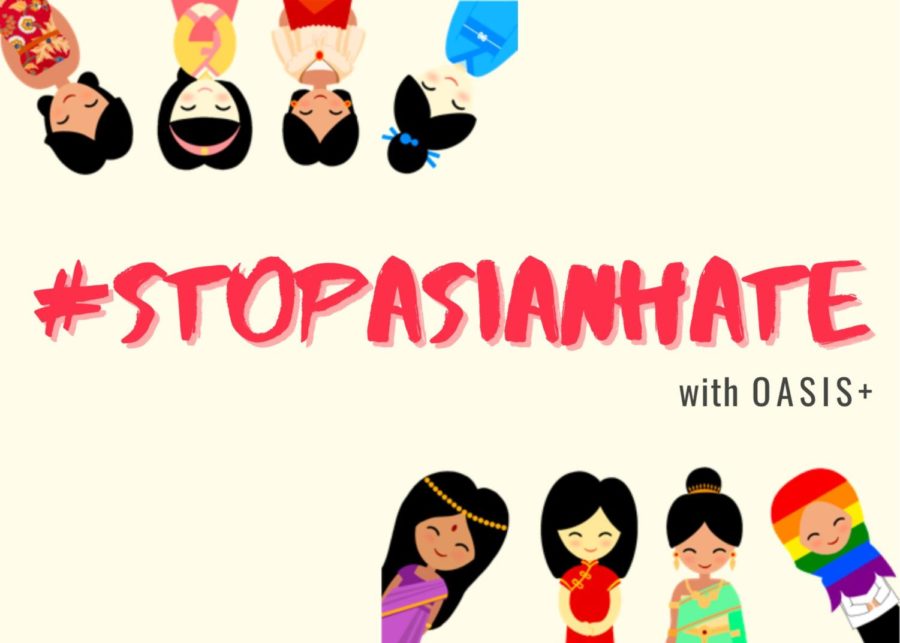OASIS+ Organizes Fundraiser in Response to Recent Anti-Asian Hate Crimes
In response to the recent rise of anti-Asian hate crimes across the U.S., Colgate’s Organization of Asian Sisters in Solidarity (OASIS+) organized a fundraiser to raise money for Asian Americans Advancing Justice-Atlanta, a non-profit legal aid and civil rights organization located in Atlanta, Georgia. OASIS+ is currently selling T-shirts to support the victims and families impacted by the acts of violence on Tuesday, March 16, during which a 21-year old white gunman opened fire on three Asian-owned spas, killing eight people, six of whom were Asian women.
The T-shirt campaign will close on Friday, April 6, and is part of a larger effort to respond to and show solidarity with communities that have been affected by these hate crimes, which is otherwise lacking from the greater campus community, according to OASIS+ representatives.
The T-shirts are designed by junior and OASIS+ Officer of Events junior Jessica Zhao. According to a post on the OASIS+ Instagram, the shirts feature a body split between male and female, symbolizing that perpetrators of anti-Asian hate target all genders. The color of the figure’s red clothing represents happiness, power, purity, fertility, prosperity and other symbols of good fortune in many Asian countries, and tapers off to form droplets that symbolize the violence directed towards Asians in America, the post states. Zhao hopes that those who purchase shirts will be proud to wear them in solidarity.
OASIS+ aims to provide a forum for the exchanging of individual Asian experiences at Colgate that have been traditionally underrepresented or unvoiced, and to create a safe space for Asian women and LGBTQ+ identifying members to establish and affirm their presence in the greater campus community. Sophomore Ana Jonke, an active member of OASIS+ on campus, expressed strong feelings toward the delayed campus response to anti-Asian rhetoric embedded in American society.
“The thing is that, with anti-Asian American violence and hate, it’s been going on for such a long time. It’s only now that the movement is being introduced to people and that’s great,” Jonke said. “But at the same time, I am sort of asking myself the question, ‘When was it an appropriate time for us to finally say something?’”
Several professors who specialize in the field of Asian Studies expressed their discontent with the lack of support and recognition for groups like OASIS+ on campus, as well as for Asian and Asian American students in general during this time.
When asked about the ways in which students and faculty can engage more deeply with this issue in moving forward as a unified campus against racial and ethnic injustices, Assistant Professor of Religion Brenton Sullivan suggested that there is a need for more open discussions on campus about the ongoing global persecution of Asians across Asia and the United States.
“The conversation around the responsibilities of ‘bystanders’ is an important one for us here at Colgate to engage with,” Sullivan said.
In conversation about Colgate’s current climate in relation to national hate crimes, Associate Professor of English and Women’s Studies Nimanthi Rajasingham said that the recent attacks remind her of the kind of violence that was directed towards Muslims after 9/11, who were suspected of being terrorists.
Following the attack in Atlanta, Rajasingham spoke with the Asian-American students in her classes. She said that many of them expressed that, while they appreciated the Administration’s email in response to the tragedy in Atlanta, they felt that there was no student response of solidarity beyond that. Rajasingham noted that there is very little focus on Asian American Studies as a field of study independent from immigrant literature at Colgate, and is considering the ways in which cultivating a more inclusive curriculum may improve the social and academic environment for Asian American students.
“[Applying more focus to Asian American Studies] is something that could change institutionally to centralize these conversations,” Rajasingham said.
Grace*, a member of OASIS+, offered her perspective on what it feels like to be Asian or Asian American on Colgate’s campus right now.
“I have had very little reason to believe that Colgate is unsafe, but with a surge in anti-Asian attacks, this is a worry that has now creeped into the back of my mind. However, I’m very lucky to have friends and professors who have reached out to me with words of comfort and support, but the overall situation in the U.S. right now makes me feel very helpless,” Grace said.
Grace emphasized that showing support for the Asian community on campus can mean many things.
“As far as I am aware, there are no other organizations on campus that have made efforts to support the Asian community except through our fundraiser,” Grace said. “This support could be in the form of checking in on the Asian community, promoting works by Asian producers, educating the public about historical racism towards Asians, and spreading awareness of our struggles.”
According to student organizers, the campaign is over halfway to its fundraising goal, and the group hopes that its efforts will help spread awareness of the struggles plaguing Asian communities across the U.S.
*All identifying details have been changed to preserve source anonymity.
Erin Knox is a senior from Branford, CT concentrating in English with a minor in economics. She has previously served as a staff writer for The Maroon-News....









